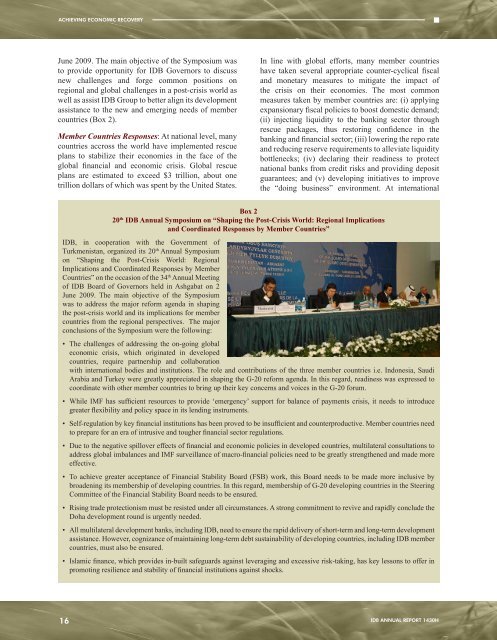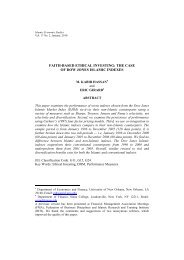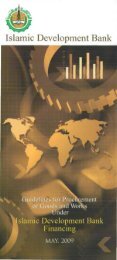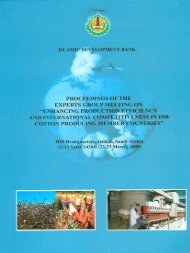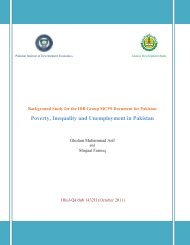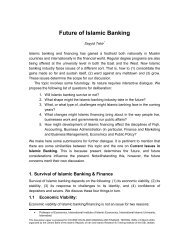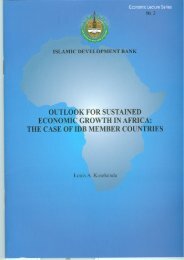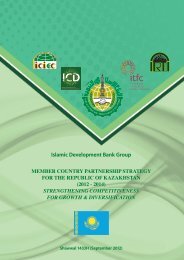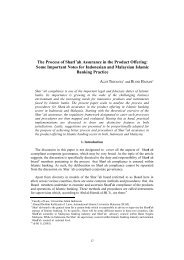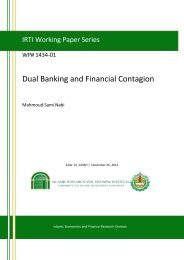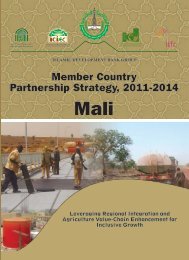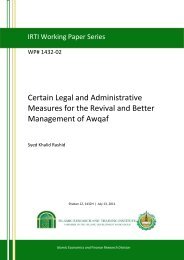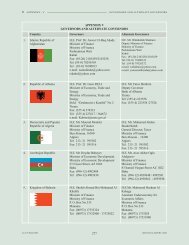35th 1430H - Islamic Development Bank
35th 1430H - Islamic Development Bank
35th 1430H - Islamic Development Bank
Create successful ePaper yourself
Turn your PDF publications into a flip-book with our unique Google optimized e-Paper software.
ACHIEVING ECONOMIC RECOVERYJune 2009. The main objective of the Symposium wasto provide opportunity for IDB Governors to discussnew challenges and forge common positions onregional and global challenges in a post-crisis world aswell as assist IDB Group to better align its developmentassistance to the new and emerging needs of membercountries (Box 2).Member Countries Responses: At national level, manycountries accross the world have implemented rescueplans to stabilize their economies in the face of theglobal financial and economic crisis. Global rescueplans are estimated to exceed $3 trillion, about onetrillion dollars of which was spent by the United States.In line with global efforts, many member countrieshave taken several appropriate counter-cyclical fiscaland monetary measures to mitigate the impact ofthe crisis on their economies. The most commonmeasures taken by member countries are: (i) applyingexpansionary fiscal policies to boost domestic demand;(ii) injecting liquidity to the banking sector throughrescue packages, thus restoring confidence in thebanking and financial sector; (iii) lowering the repo rateand reducing reserve requirements to alleviate liquiditybottlenecks; (iv) declaring their readiness to protectnational banks from credit risks and providing depositguarantees; and (v) developing initiatives to improvethe “doing business” environment. At internationalBox 220 th IDB Annual Symposium on “Shaping the Post-Crisis World: Regional Implicationsand Coordinated Responses by Member Countries”IDB, in cooperation with the Government ofTurkmenistan, organized its 20 th Annual Symposiumon “Shaping the Post-Crisis World: RegionalImplications and Coordinated Responses by MemberCountries” on the occasion of the 34 th Annual Meetingof IDB Board of Governors held in Ashgabat on 2June 2009. The main objective of the Symposiumwas to address the major reform agenda in shapingthe post-crisis world and its implications for membercountries from the regional perspectives. The majorconclusions of the Symposium were the following:• The challenges of addressing the on-going globaleconomic crisis, which originated in developedcountries, require partnership and collaborationwith international bodies and institutions. The role and contributions of the three member countries i.e. Indonesia, SaudiArabia and Turkey were greatly appreciated in shaping the G-20 reform agenda. In this regard, readiness was expressed tocoordinate with other member countries to bring up their key concerns and voices in the G-20 forum.• While IMF has sufficient resources to provide ‘emergency’ support for balance of payments crisis, it needs to introducegreater flexibility and policy space in its lending instruments.• Self-regulation by key financial institutions has been proved to be insufficient and counterproductive. Member countries needto prepare for an era of intrusive and tougher financial sector regulations.• Due to the negative spillover effects of financial and economic policies in developed countries, multilateral consultations toaddress global imbalances and IMF surveillance of macro-financial policies need to be greatly strengthened and made moreeffective.• To achieve greater acceptance of Financial Stability Board (FSB) work, this Board needs to be made more inclusive bybroadening its membership of developing countries. In this regard, membership of G-20 developing countries in the SteeringCommittee of the Financial Stability Board needs to be ensured.• Rising trade protectionism must be resisted under all circumstances. A strong commitment to revive and rapidly conclude theDoha development round is urgently needed.• All multilateral development banks, including IDB, need to ensure the rapid delivery of short-term and long-term developmentassistance. However, cognizance of maintaining long-term debt sustainability of developing countries, including IDB membercountries, must also be ensured.• <strong>Islamic</strong> finance, which provides in-built safeguards against leveraging and excessive risk-taking, has key lessons to offer inpromoting resilience and stability of financial institutions against shocks.16IDB ANNUAL REPORT <strong>1430H</strong>


